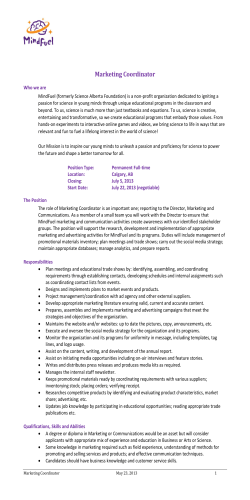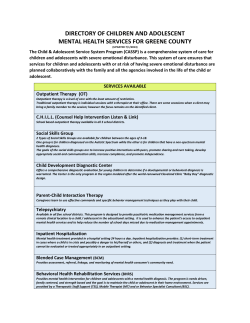
KARDEL Home Share Providers Guide CARF Accredited Homes and Programs
KARDEL Home Share Providers Guide CARF Accredited Homes and Programs CARF Accredited Home Shares Telephone 250-382-5959 Fax: 250-383-2835 Website: www.kardelcares.ca All contact numbers at Kardel have voice mailboxes so you can leave messages. Kardel Consulting Services Inc., Room 209 2951 Tillicum Road, Victoria, B.C. V9A 2A6 How to Contact Kardel Consulting Services Inc. ` Kardel Main Office 250-382-5959 List of extensions Jen Neely - Home Share Coordinator – 250-382-5959 ext. 233 Carla Hunt - Home Share Coordinator – 250-382-5990 Kim Lichtensteiger - Home Share Coordinator – 250-382-5959 ext. 231 Community Emergency Contacts: Poison Control - 1-800-567-8911 Police or RCMP - 911 Health Link BC - 811 Provincial Emergency Program Info. 250-952-4913 Power outages and emergencies 1-888-769-3766 OR 1 888 POWERO Useful Contacts for Caregivers: BC Home Share Providers Association www.bchomeshare.com Canada Revenue Agency www.cra-arc.gc.ca Community Living British Columbia (CLBC) www.communitylivingbc.ca CLBC Quality Service Office 250-387-6099 Employment Standards www.labour.gov.bc.ca/esb Human Rights Tribunal www.bchrt.bc.ca Information & Privacy Commissioner www.oipcbc.org Nidus - Decision Making www.nidus.ca Office of the Public Guardian and Trustee www.trustee.bc.ca Workers Compensation Board www.worksafebc.com Add your Pharmacists contact information here: After Hours Coverage: Between the hours of 8:30am and 4:30pm Home Share Coordinators are available to assist you with any of your concerns. Outside of these hours, we would like you to access the appropriate emergency service available to you within your community, notifying us the next day of the incident. In the Event of the Death of the individual supported, contact the paramedics immediately and notify your Home Share Coordinator. If your Home Share Coordinator is unavailable or if after hours, please call one of the following individuals in the order they appear. 1. Stuart Munger- 250 508-2514 2. Cathy Elford- 250 744-8850 3. Karl Egner 250-216-6990 2 WELCOME TO OUR SERVICES This guide is an overview for people interested in becoming or already a home share provider with Kardel. Table of Contents About Us Overview ........................................................................................................ ........... 4 Our Mission ................................................................................................... ........... 4 Our Vision ...................................................................................................... ........... 4 Our Values ..................................................................................................... ........... 4 Ethical Responsibility to the People We Support ......................................... ........... 4 Becoming a Home Share Provider Becoming a Home Share Provider ................................................................ ........... 5 The Matching Process……………………………………………………………………………….. ........... 6 Transition Plan ............................................................................................... ........... 6 What is an Independent Contractor ............................................................. ........... 7 Your Contractual Obligations ........................................................................ ........... 7 Funding .......................................................................................................... ........... 8 Information provided to all Home Share Providers at time of Placement ... ........... 8 Monitoring and Evaluation ........................................................................... ........... 9 Reporting ...................................................................................................... ........... 10 Taking Care of Yourself .................................................................................. ........... 10 Respite .......................................................................................................... ........... 10 Rights and Responsibilities Rights and Safeguards ................................................................................... ........... 11 Informed Consent: Risk Versus Choice .......................................................... ….………11 Resolving Concerns ........................................................................................ ........... 11 Appeals .......................................................................................................... ........... 12 CARF Accreditation ........................................................................................ ........... 12 Self-Advocacy ................................................................................................ ........... 12 3 About Us Overview In 1987, Kardel Consulting Services was founded by Dr. Karl Egner to address the support and service needs of people leaving institutions. Kardel is an organization offering a broad range of high-quality services to people with developmental disabilities. We provide individualized services; assist people with inclusion in their community while maintaining excellent health care, safety, and security for the people we support. We remain sensitive to the person’s culture, age, gender, sexual orientation, spiritual beliefs, socio-economic status, and language. Kardel also operates a number of Group Homes, contracts with over 60 individuals supported by Home Share Providers, offers a Day Program and an Individual Support Network for people with developmental disabilities. Our Mission Kardel’s mission is to help people with developmental disabilities have a good life and to respect their personal choices. Our Vision Kardel’s vision is that of a community where all members live a full life, feel included, and are empowered to make personal choices in their lives. Our Values Kardel’s commitment is to enhance a high quality of life for the people supported. Kardel believes in the following core values: Respect Community Inclusion and Participation Human Connection Person-Centered Approach Open and Transparent Communication High Standards and Quality Ethical Responsibility to the People We Support Kardel has the following ethical responsibilities to the people we support: To protect those we support from abuse and neglect To identify and maintain the best interests of the people we serve and advocate for those interests To respect confidentiality To be non-judgmental and supportive To recruit competent Home Share Providers with a value base consistent with Kardel’s values 4 To facilitate communication for the people we support and to provide them with coping strategies and problem-solving skills To help the people we support access appropriate and relevant services by working closely with other services in our community Becoming a Home Share Provider Home Share Providers are unique people. You open your home and life to include an individual and their support network. In doing so, you will build relationships with the person supported and their friends and family. You may also learn new things about yourself in the process. You need to be flexible, understanding, organized, open-minded and welcoming. You need to celebrate diversity. You need to be a problem-solver, and a good communicator with a sense of humour. You need to take care of yourself so you can provide the support long-term. Your role is to provide safe care and support to the individual in a non-judgmental, inclusive environment. You are responsible for the safety, health, and well-being of the person supported, and for making sure that person has the opportunity for personal and social development both inside and outside of your home. You are the key contact for communicating with your Home Share Coordinator at Kardel, the individual, and their friends and family. In order to be considered for Home Sharing you must meet the following prerequisites: A criminal record check for every individual aged 19 years or older Three reference checks A Home Inspection Drivers Abstract First Aid Car Insurance with a minimum of 2 million liability A completed Medical Assessment Form from your Doctor Candidate Interview Candidate Interview The candidate interview allows the Home Share Coordinator to review gathered information and to meet in person with all members of the home. This step must be conducted in a manner that is open, transparent, and respectful of the sensitive nature of these areas being reviewed. Through this process the Home Share Coordinator is guided by the assumption that a person’s past behavior and experiences are a strong indicator of future possibilities. A history of abuse, neglect, mental health issues, and addictions all relate to the development of healthy relationships with others. For this reason it is important to examine the areas when meeting with all potential home sharing providers. Once all of the above criteria have been met, the Home Share Coordinator reviews the documentation and makes recommendations to the program manager for approval. 5 The manager will review the documents and together with the coordinator they will decide if the applicant has been approved as a Kardel Home Share Provider. The Matching Process There are a number of considerations to take into account when matching a Home Share Provider with an individual supported: Degree of compatibility The physical, social, emotional and behavioral needs of the individual supported. Location of the home Physical accessibility of the home based on the needs of the individual supported Configuration of the home (basement suite vs. bedroom in home) Once it is agreed that you are an approved Home Share Provider there is an undefined waiting period. It is vital that a well matched Home Share placement is established to ensure a stable, longterm relationship between the individual supported and the Home Share Provider. Once an individual has been identified as a potential match for a home share provider, a series of meetings will take place. The initial meeting may involve family members, CLBC facilitators, advocates and the individual supported. When a suitable match has been found, a transition process begins involving Kardel, CLBC, the new Home Share Provider and the individual supported. Transition Plan When a potential match has been made, Kardel focuses on a slow transition plan that everyone involved is comfortable with. The home share coordinator, the person requiring support, and their family when appropriate work with the home share provider to complete the transition plan. This plan lists any specific training required by the home share provider, any specific alterations that may be required for the home, the targeted move in date, and who is responsible to arrange things such as cable, internet, and telephone when applicable. Most often, there is a trial phase that starts with short visits with the individual spending time at the home share provider’s home which may develop into full days, overnights, and weekend visits. This is a chance for everyone to get to know one another and evaluate how the arrangement will work. Once the transition phase has begun and a targeted move in date has been established the: Home Share Provider, CLBC facilitator, Kardel home share coordinator, individual, and family (if applicable) work together to ensure all items on the Home Share move-in checklist are completed as the moves takes place. 6 What is an Independent Contractor? Independent Contractors are self-employed individuals. Generally, if you control how, when and where you carry out your duties, use your own space and equipment, and have a chance to make a profit or loss, you are an independent contractor. The BC Employment Standards Branch is responsible for determining who is an independent contractor. Please forward any specific questions about eligibility to their offices. As an independent contractor under contract with Kardel to provide Home Sharing services you are covered under the General Master Insurance Plan (GMIP). This plan is designed to cover liability insurance to third parties only with a limit of $2 million for any one event. You should also consult an insurance professional to ensure you have adequate liability, household, vehicle and other insurance coverage. You will be paid on the basis outlined in your contract with Kardel. You will not receive a T4 slip, and Kardel does not make any remittances to Canada Revenue Agency on your behalf. If you have any questions about taxation, please contact a tax professional and/or an accountant. You are obligated to adhere to the laws of B.C.: including the Human Rights Act, the Multiculturalism Act and the Personal Information Protection Act. More information on all these areas is available from the websites listed within this guide. Your Contractual Obligations Your contract is the legal document that governs your relationship with Kardel and the services you provide. The purpose of the contract is to set out our mutual obligations, and define who you will provide care for and how much you will be paid. It also sets out the terms under which either you or Kardel may terminate the contract. Below are examples of some of the key obligations that are stated within the contract. Participate in orientation and/or training related to the needs of the individual you will be supporting Adhere to routines and plans as set out in the individual’s care plan As required, follow the behaviour management requirements of Community Living British Columbia Perform support functions, including sustaining the individual’s well-being, and providing a high standard of care that may include providing a suitable furnished residence Communicate regarding the individual’s needs and interests; involve the individual in planning and decision-making affecting him or her; and promote ongoing relationships with the individual’s family/friends/support network Document any medical emergencies or critical incidents pertaining to the individual Actively promote community inclusion and involvement Notify Kardel of any change in circumstance that would affect the individual’s safety or well-being Treat all information about the individual/family as confidential, and adhere to privacy requirements 7 Follow through with established plans for the individual Collect any medical or other information needed to meet the individual’s needs Arrange for appropriate respite care Obtain and retain copies of Respite Providers Criminal Record checks and First Aid certificates All Home Share Providers and Respite Providers are required to be covered under Work Safe BC. The Workers Compensation Act establishes a no-fault workplace accident insurance plan. Home Share providers can obtain personal optional protection (POP) coverage for themselves. In addition, if the provider hires or contracts with respite providers, the respite providers must also obtain personal optional protection (POP) coverage for themselves. To find out more about POP coverage, we recommend you contact Work Safe BC directly. You are required to provide Kardel with a clearance letter from the board verifying that you are registered under the act. Kardel will obtain clearance letters from time to time to ensure your premiums have been paid and are up to date. We strongly recommend that you consult with Worksafe BC prior to making a decision on how you arrange your workers compensation coverage. If you have any questions about the content of the contract, you should clarify these before signing. Discuss this either with the Kardel Home Share Coordinator, and/or through independent legal advice. Funding The Ministry of Social Development provides a monthly rate for each person receiving income assistance and residing in home share. A portion per month is paid to cover shelter and support costs, leaving each person a monthly allowance for all personal expenses. This includes nonprescription medications, leisure and recreational activities, gifts, personal care items or services, videos, restaurant meals, hairdressing, memberships, vacations, subscriptions and music. CLBC establishes a funding support level based on the individual’s disability related needs. This amount is paid to the Home Share Provider for the support and care of the person living with them. This funding amount also incorporates a respite element for the Home Share Provider. Information provided to all Home Share Providers at time of Placement All Home Share Providers are given a copy of the Home Share Guide Book. This guide book is a detailed booklet that forms part of the contractual agreement with the Home Share Providers. Home Share providers also receive the following documents: A copy of the Personal Support Plan A copy of the individual’s care plan and health care plan if applicable Critical Incident forms A link to CLBC’s Home Share Provider’s Handbook through their website (www.communityliving.bc.ca) At the time of contract signing, the home share coordinator also goes through the resource checklist to ensure the home share provider is aware of various community resources, Kardel’s website, Kardel’s after hour’s system, and various protocols. 8 Kardel maintains regular contact with Home Share Providers to ensure they have the resources they require on an ongoing basis. Especially within the first 6 months of providing support to an individual. Monitoring and Evaluation Monitoring of Home Share arrangements occur frequently and informally throughout the year. The Home Share coordinator maintains contact with individuals, families, and home share providers on a regular basis to ensure the supports continue to meet the individual’s needs. In addition, the coordinator meets with the individual and home share provider to conduct formal monitoring of the home share arrangement. This Monitoring Tool occurs within 30 days for new placements and every 90 days thereafter in the first year. After the first year, monitoring visits will be done twice yearly, unless the individual’s situation merits more frequent visits. For existing Home Share Providers, Monitoring Tool visits will also be completed twice yearly. Kardel uses a Monitoring Tool for Home Sharing; this Monitoring Tool meets the standards of both CARF and COA and is a comprehensive document that provides an in-depth analysis of the services provided by the Home Share Provider. This review includes areas such as: Planning: Person-Centered Planning, Health Care Planning, Transition Planning Health, Safety, and Advocacy – Individual care and support, safety and security, individual rights, home atmosphere Service Delivery – Activities, family and friends, and community involvement Resources – leadership, and coordination of support, staffing (if applicable), training, guidelines and procedures, communication and problem resolution. This document enables the Home Share Coordinator to determine whether the Home Share Provider is meeting expectations in each area or whether improvement is required. For each domain, the following format is used: Standard • Service outcome expectation and various indicators for review • Assessment (meets expectation or needs improvement) • Key findings (narrative) • Section plan to address improvements needed (if required) Kardel’s Home Sharing Health and Safety Checklist is used in conjunction with the Monitoring Tool to ensure the home meets all applicable standards such as first aid supplies, emergency supplies, smoke detectors, and any health and safety related items. The annual Person-Centered Planning meetings are facilitated for each individual within the home share network. This is a comprehensive meeting that covers all aspects of the individual’s life within the quality of life domains. Areas for discussion with the individual and his or her support network include: • Emotional Well-Being • Interpersonal Relations • Material Well-Being • Personal Development • Physical Well Being 9 • • • Self Determination Social Inclusion Rights During the meeting the Kardel facilitator will assist the individual to identify plans to attempt or achieve throughout the year. For a new Home Share Provider it is required that the Person-Centred Plan (PCP) is completed within 3 months of the person moving into the home Reporting Home Share Providers are responsible to report any changes or significant issues/events that may occur for the individual or within the family dynamics on an ongoing basis. Regular ongoing communication is encouraged and expected between the Home Share provider, the individual’s family and the Home Share Coordinator. In addition to ongoing communication throughout the year, Home Share Providers are responsible to complete the Quality Of Life Report semi-annually. This report is due at the end of June and December each year. Taking Care of Yourself There are many positive benefits to being a Home Share provider. There can also be stresses and challenges – physical, mental, and emotional. We suggest that you take good care of yourself first, so that you will have the energy to take care of others. Know the signs of stress and have a plan in place to deal with your stress so that it doesn’t escalate to the point where it adversely affects your relationships. Make sure that you identify and make time to meet your own needs. If you are feeling overwhelmed as a result of the demands of the individual you are caring for, communicate your feelings to your Home Share Coordinator who may be able to help you problem solve and use respite. Respite Your monthly contract will have 2 days of respite built into the base rate you receive for the individual you support. For individuals with higher support needs, an additional amount of respite or support dollars may be available. If this is the case, you will need to keep track of the use of this money and be able to prove that you have been using it as it was intended. Respite/support arrangements can be flexible to meet your needs and schedule. It could mean arranging for someone to stay in your home while you go away, or arranging for the individual to spend time in a respite provider’s home. Respite may be for extended periods of times, i.e. an overnight or a weekend, or it may just be occasional hours throughout the week. We strongly encourage you to make use of this provision. When using respite, you have the following responsibilities: Ensure the respite provider understands the needs of the individual based on their care plan Provide information regarding medication monitoring and management Obtain and hold a current criminal record check of the respite provider Obtain and hold a copy of the respite providers First Aid/CPR certificate Certify that the respite home is a safe and secure environment 10 Schedule the times with the respite provider Pay the respite provider Keep records for expenditures (we or CLBC may request to review these records during our monitoring visit) Develop a Respite Plan that is submitted to your Home Share Coordinator Rights and Safeguards To review the BC Human Rights Code and Tribunal, please visit the website www.bchrt.bc.ca. In addition to the basic human rights for every citizen of BC, an adult person in care has the right: To a care plan specifically developed for him or her To the protection and promotion of his or her health, safety and dignity To be protected from abuse and neglect To have his or her lifestyle, choices, and personal privacy respected To participate in his or her own care To freely express his or her views To make his or her own decisions Informed Consent: Risk versus Choice Kardel believes that adults with developmental disabilities have the right to make their own decisions. Home Share Providers provide information to the people we support in plain language or in a manner the person understands to assist with decision-making. Each person is fully informed about potential risks and benefits. When the person requests, requires, or agrees to assistance with decision-making, then family or advocates are invited to participate. Respect for the rights of the people we support is an important part of our services. Any breach of rights should be brought forward in the same manner as outlined under our resolving concerns process. Resolving Concerns Kardel makes every effort to address the concerns of the people we support and others involved with our services in a comprehensive, timely, professional and sensitive manner. The people we support, home share providers, families, volunteers, advocates, and community members are encouraged to bring their concerns forward. If possible, they speak directly to the individual involved in any complaint first. If this doesn’t bring about a resolution, a formal complaint process can be pursued. Kardel will inform any complainant about the complaint resolution process. All parties have a responsibility to deal with complaints with mutual respect. Private and personal information is kept confidential except for those responsible for finding a solution. People wishing assistance to file a complaint may contact the Director of Programs and Quality Assurance through the Kardel Office at 250-382-5959 ext 232. 11 Appeals People supported, Home Share Providers or their families may contact external organizations with concerns. Kardel welcomes outside investigation and recommendations pertaining to issues of quality within our services. Depending on the nature of the complaint, people may request external investigation from the following: CLBC: Quality Assurance office 1-855-664-7972 The BC Human Rights Tribunal 1-888-440-8844 Office of the Information and Privacy Commissioner for BC 1-800-663-7867 Office of the Public Guardian & Trustee 1-604-660-4444 Ombudsperson BC 1-800-567-3247 CARF Accreditation In January 2004, Kardel was awarded a three-year CARF (Commission on Accreditation of Rehabilitation Facilities) accreditation for its ten homes and Futures Club day program. In December 2006, CARF awarded Kardel its second three-year accreditation and in August 2010, its third three-year accreditation. CARF is an independent, not-for-profit accrediting body whose mission is to promote the quality, value, and optimal outcomes of services through a consultative accreditation process that centers on enhancing the lives of the persons served. Kardel has undertaken a rigorous peer review process and, during an on-site visit, we have demonstrated to a team of CARF surveyors that we are committed to meeting CARF’s accreditation standards. In keeping with CARF Standards, Kardel has established a process for Continuous Quality Improvement. We annually survey all the people we support, their families, staff, volunteers and other stakeholders for ideas to improve the quality of our services. Self-Advocacy We encourage people to speak for themselves and join groups that advocate for improved conditions for people with disabilities. Kardel sponsors “Self Advocates for a Brighter Future” along with Becon Support Services. Information about meetings is posted each month at each Kardel site on ShareVision and/or from the managers or coordinators. End 12
© Copyright 2026











